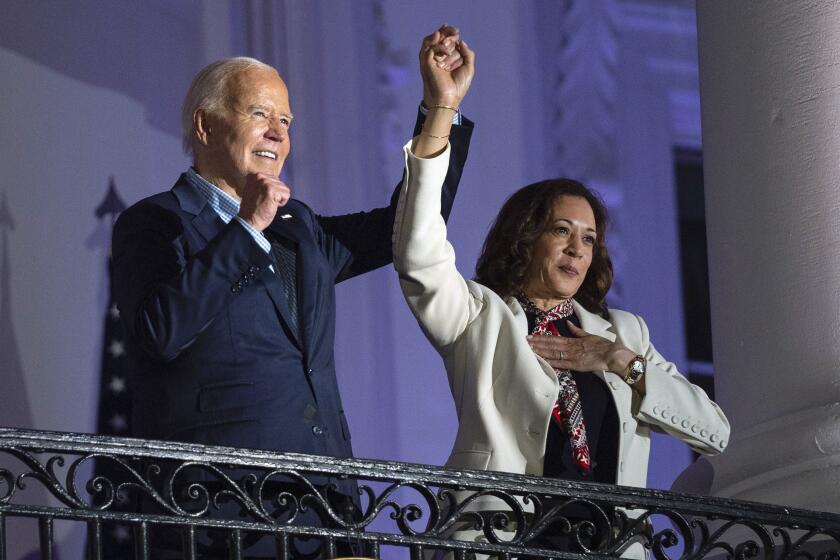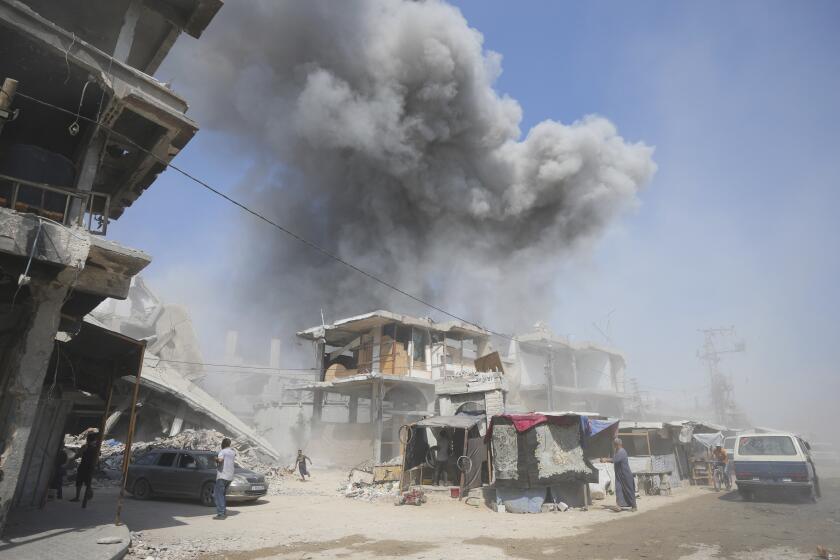Mandela to Seek Oil Embargo Against Nigeria Military Regime : Politics: S. Africa’s president wants severe sanctions in the wake of last week’s executions. U.S. unlikely to heed call.
Hoping to use his moral authority and global prestige, President Nelson Mandela said Wednesday that he will lead a campaign for an international oil embargo against the military regime in Nigeria in a push for immediate democratic reforms.
Mandela is the first major political leader to call for such severe sanctions against the repressive rulers of Africa’s most populous nation following the executions Friday of author Ken Saro-Wiwa and eight other political activists.
Mandela’s new hard-line policy against Gen. Sani Abacha’s dictatorship is a direct challenge to the Clinton Administration and other major Western governments, which so far have refused to consider banning the purchase or trade of Nigerian oil.
“I am not satisfied with the fact that they are not applying oil sanctions,” Mandela told a news conference in New Zealand, where he is on a state visit.
Mandela will try to bring his campaign for a punitive boycott before the United Nations Security Council, the Organization of African Unity and other international bodies, his spokesman said here.
“Our role will be to give it moral and political authority,” said spokesman Parks Mankahlana. “The reality is the whole democratic process in Africa is now being threatened. President Mandela is being pushed to the point where he has to do something. Otherwise his own credibility is at stake.”
Mandela said he was unable to reach President Clinton by telephone because of the time difference between New Zealand and Washington, but called British Prime Minister John Major early Wednesday to appeal for support. Major previously had warned that punishing sanctions could backfire by wrecking Nigeria’s economy without necessarily bringing democratic change.
Clinton Administration officials have said a unilateral oil boycott is highly unlikely, since it would hurt U.S. commercial interests and consumers. Nigeria is America’s fifth-largest supplier of oil, and major lenders in the United States, Europe and Japan would be damaged if the West African country failed to make payments on its $30-billion foreign debt.
The State Department said Wednesday that Mandela’s call for a boycott has not changed its position.
“At this time, an oil embargo is not an option for the United States. Unilateral action will not be effective because of the ready global market for Nigeria’s high-quality crude,” a spokesperson said. “But we do not rule out considering oil sanctions--or any other option--at a future date.”
Sanctions would be both difficult and expensive to impose. An oil industry expert here said that most Nigerian oil is refined in Houston and that a boycott could require costly retooling of unloading facilities and refineries there.
In addition, he said, Nigerian “sweet crude,” a lightweight oil that is refined into gasoline, would be difficult to control on world markets, because it is similar to oil extracted from Alaska’s North Slope and off Britain.
“There are enough buyers, and once it gets out, it’s very difficult to identify,” he said.
Washington already honors a U.N. oil embargo against Iraq and maintains unilateral oil sanctions against Libya and Iran. The moves have yet to topple any of those regimes, partly because they continue to sell considerable amounts of oil. South Africa, for example, imports nearly all its oil from Iran.
The Clinton Administration does not consider Nigeria’s brutal regime to be in the same league of outlaw states because it isn’t seen as a threat to international peace and security, officials said.
The United States receives up to half of Nigeria’s oil, and major American oil companies--especially Mobil, Chevron and Texaco--have invested about $4 billion in facilities there, according to the U.S. Embassy in Lagos, the country’s commercial capital.
The largest producer is Royal Dutch/Shell, the giant oil conglomerate based in London and The Hague. The company announced Tuesday that it plans to go ahead with a new, $3.8-billion liquefied natural gas project in Nigeria. It will be the biggest single foreign investment in Africa if it proceeds.
Nigeria is the second-largest economy on the continent after South Africa, thanks to oil. Production of about 1.8 million barrels per day is worth about $10 billion a year. That is 80% of Nigeria’s annual revenues and 95% of its foreign exchange. But little of the oil income reaches the impoverished population, due to corruption, poor administration and inefficiency.
The military government maintains order through ruthless security forces, secret trials, political imprisonments and other human rights abuses. Opposition groups are largely underground and powerless.
Abacha’s government had no immediate response to Mandela’s call for an oil boycott.
Mandela’s move came after a weekend of mounting, but largely symbolic, signs of global outrage. The United States, Britain, Canada and at least 15 other countries recalled their ambassadors from Nigeria and imposed restrictions on travel and weapons sales.
In addition, the 52-nation Commonwealth club composed of Britain and its former colonies voted to suspend Nigeria from membership and threatened to expel it unless democratic reforms are in place within two years.
Abacha, who seized power two years ago this week after the military annulled democratic elections, announced last month that he would allow a series of staggered elections leading to civilian rule after three years.
Mandela’s call for strict sanctions has unique resonance: The world imposed economic, diplomatic and cultural sanctions in the 1980s against the white minority regime that ruled South Africa. That effort played a crucial role in winning Mandela’s freedom after 27 years in prison and bringing an end to apartheid.
Nigerian newspapers reported graphic details of the executions of Saro-Wiwa and the eight others, who campaigned for oil royalties and self-determination for ethnic Ogonis in oil-rich southern Nigeria.
The daily newspaper AM News reported that it took five attempts to hang Saro-Wiwa because of faulty equipment. At one point, the paper reported, the blindfolded playwright and writer pleaded, saying, “Why are you people treating me like this? Which type of country is this?”
His last words before his body went limp, the paper reported, were: “Lord take my soul, but the struggle continues.”
Saro-Wiwa and his followers were convicted by a military-led court of murdering four Ogoni rivals. He and his supporters said he was framed by the government.
Times staff writer Robin Wright in Washington contributed to this report.
(BEGIN TEXT OF INFOBOX / INFOGRAPHIC)
Nigeria Fact Sheet
Population: 98 million
Area: 356,669 square miles, more than twice the size of California
Industries: crude oil (95% of exports), food processing, assembly of vehicles, textiles
Chief crops: cocoa (main export crop), tobacco, palm products, peanuts, cotton, soybeans
Literacy: 51%
Life expectancy: men 54 years; women 57
Source: World Almanac
More to Read
Sign up for Essential California
The most important California stories and recommendations in your inbox every morning.
You may occasionally receive promotional content from the Los Angeles Times.







